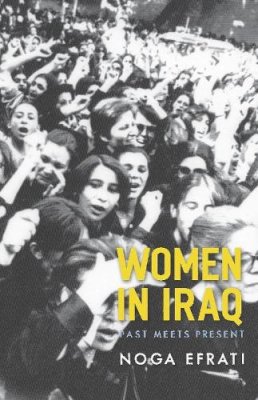
Stock image for illustration purposes only - book cover, edition or condition may vary.
Women in Iraq: Past Meets Present
Noga Efrati
€ 89.84
FREE Delivery in Ireland
Description for Women in Iraq: Past Meets Present
Hardback. Num Pages: 256 pages. BIC Classification: 1FBQ; 3JJ; HBTB; JFSJ1. Category: (P) Professional & Vocational. Dimension: 235 x 158 x 20. Weight in Grams: 464.
Noga Efrati outlines the first social and political history of women in Iraq during the periods of British occupation and the British-backed Hashimite monarchy (1917-1958). She traces the harsh and long-lasting implications of British state building on Iraqi women, particularly their legal and political enshrinement as second-class citizens, and the struggle by women's rights activists to counter this precedent. Efrati concludes with a discussion of post-Saddam Iraq and the women's associations now claiming their place in government. Finding common threads between these two generations of women, Efrati underscores the organic roots of the current fight for gender equality shaped by a memory of oppression under the monarchy. Efrati revisits the British strategy of efficient rule, largely adopted by the Iraqi government they erected and the consequent gender policy that emerged. The attempt to control Iraq through "authentic leaders"-giving them legal and political powers-marginalized the interests of women and virtually sacrificed their well-being altogether. Iraqi women refused to resign themselves to this fate. From the state's early days, they drew attention to the biases of the Tribal Criminal and Civil Disputes Regulation (TCCDR) and the absence of state intervention in matters of personal status and resisted women's disenfranchisement. Following the coup of 1958, their criticism helped precipitate the dissolution of the TCCDR and the ratification of the Personal Status Law. A new government gender discourse shaped by these past battles arose, yet the U.S.-led invasion of 2003, rather than helping cement women's rights into law, reinstated the British approach. Pressured to secure order and reestablish a pro-Western Iraq, the Americans increasingly turned to the country's "authentic leaders" to maintain control while continuing to marginalize women. Efrati considers Iraqi women's efforts to preserve the progress they have made, utterly defeating the notion that they have been passive witnesses to history.
Product Details
Format
Hardback
Publication date
2012
Publisher
Columbia University Press United States
Number of pages
256
Condition
New
Number of Pages
256
Place of Publication
New York, United States
ISBN
9780231158145
SKU
V9780231158145
Shipping Time
Usually ships in 7 to 11 working days
Ref
99-1
About Noga Efrati
Noga Efrati is a research fellow at the Harry S. Truman Research Institute for the Advancement of Peace at the Hebrew University of Jerusalem and headed the Truman Institute's Post-Saddam Iraq Research Group from 2006 to 2011. A historian of the Middle East, her research focuses on the social and political history of Iraq.
Reviews for Women in Iraq: Past Meets Present
Noga Efrati's book is a most welcome addition to a number of recent studies of politics and society in Iraq under the mandate and monarchy that have demonstrated the richness of political and social life during that period.
Peter Sluglett, University of Utah, author of Britain in Iraq: Contriving King and Country Looking at the past through the lens of the present and the present through the lens of the past, Noga Efrati effectively shows how under Western rule Iraqi women's rights became a victim not once but twice, in eerily similar circumstances. In the first half of the twentieth century, the British occupation and Hashemite monarchy it spawned used tribal and family law to make women second-class citizens, disenfranchising them in the process. Women's activists fought for their rights, Efrati tells us, just as those in American-occupied Iraq in the early twenty-first century fought for theirs, opposing political marginalization, retribalization, and communalization of family law. For anyone trying to understand the contradictions and casualties of occupation, Women in Iraq is a must-read.
Beth Baron, City University of New York Efrati's book is a remarkable study that deserves much praise.
Orit Baskin Taarii Newsletter
Peter Sluglett, University of Utah, author of Britain in Iraq: Contriving King and Country Looking at the past through the lens of the present and the present through the lens of the past, Noga Efrati effectively shows how under Western rule Iraqi women's rights became a victim not once but twice, in eerily similar circumstances. In the first half of the twentieth century, the British occupation and Hashemite monarchy it spawned used tribal and family law to make women second-class citizens, disenfranchising them in the process. Women's activists fought for their rights, Efrati tells us, just as those in American-occupied Iraq in the early twenty-first century fought for theirs, opposing political marginalization, retribalization, and communalization of family law. For anyone trying to understand the contradictions and casualties of occupation, Women in Iraq is a must-read.
Beth Baron, City University of New York Efrati's book is a remarkable study that deserves much praise.
Orit Baskin Taarii Newsletter
